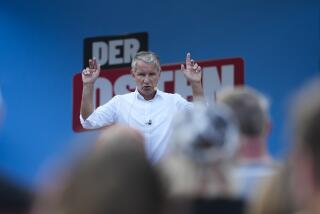Party Season Previews Israeli Elections
- Share via
JERUSALEM — It sounds a bit strange, Dorit Goldschmidt admits.
As politicians here argue over how best to forge a real peace with the Palestinians and how to extract Israeli soldiers from southern Lebanon, “we just say we have a group of people, they close their eyes, and this will create peace in the region,” says Goldschmidt, a teacher of Transcendental Meditation and spokeswoman for Israel’s Natural Law Party.
The tiny party’s earnest leadership wants the government to establish a standing body of 5,000 to 10,000 experts in “yogic flying,” a Transcendental Meditation technique in which practitioners “jump like frogs,” as Goldschmidt puts it.
The more meditators, the merrier, she says, or at least the more positive and peaceful their likely effect on the fractious Middle East. Along with affiliates in the United States and Europe, the party also believes that group meditation can reduce crime and disease and produce a flourishing economy.
“In Israel, we have tried many ways to make peace,” Goldschmidt notes. “We have nothing to lose by trying this, too.”
The party is one of the more unusual among 45 already registered to run in Israel’s May 17 election for prime minister and parliament.
The election, triggered by the December collapse of Prime Minister Benjamin Netanyahu’s government, promises to be one of the most freewheeling in Israel’s history, with at least 56 parties expected to meet the registration deadline at the end of the month. That’s nearly double the number that contested the 1996 elections.
More parties than ever before are considered likely to make it into the Knesset, Israel’s parliament. And depending on one’s point of view, that’s either a celebration of Israel’s vibrant young democracy or a recipe for increasing government chaos.
“The proliferation of parties here only increases their ability to blackmail the prime minister and hold votes hostage to their issues,” says Avraham Diskin, political science professor at Jerusalem’s Hebrew University. “It can make the government less stable.”
Israel’s political system traditionally has been a balance between two large, broad-based parties, with Likud, led by Netanyahu, on the right, and Labor, led by former Gen. Ehud Barak, on the left.
Since 1981, the two dominant parties gradually have lost Knesset seats to a variety of narrower factions. The trend accelerated in 1996, when a direct election law allowed voters to cast separate votes for Knesset and for prime minister.
The balance is likely to shift still further with the emergence of a still unnamed centrist party, led by Netanyahu’s popular former defense minister, Yitzhak Mordechai. Perhaps sensing the electorate’s yearning for the new, Labor leader Barak has even registered his venerable party under a different name: Ehad Israel, or “One Israel.”
Otherwise, with more than a dozen new parties, there seems to be one for almost every group or interest. There are far-left and hard-right parties, Jewish and Arab parties, religious and secular parties. There is a party to protect “men’s rights in the family” and another to represent the elderly.
There are two new Russian parties, a fledgling Moroccan party and a just-formed Romanian party. A pro-marijuana Green Leaf party, a pro-gambling Casino party and a taxi drivers party are all in the works.
To gain a single seat in the Knesset, a party needs the support of 1.5% of eligible voters, about 64,500. Most of the newcomers probably won’t make it in, but Ezra Tisona is betting that he will.
Tisona, the leader of the nascent Casino party and one of Israel’s best-known gamblers, says his supporters, fired up by the success of the Palestinian casino in Jericho, want to persuade the government to open gambling parlors throughout Israel.
The move would bring about “a revolution in the Israeli economy,” Tisona says, predicting that the party will win at least three seats in the election. “I am the hope of the country.”
Goldschmidt is less sure about her party’s chances of making it into the Knesset. “We’re not politicians,” she says.
More to Read
Sign up for Essential California
The most important California stories and recommendations in your inbox every morning.
You may occasionally receive promotional content from the Los Angeles Times.













